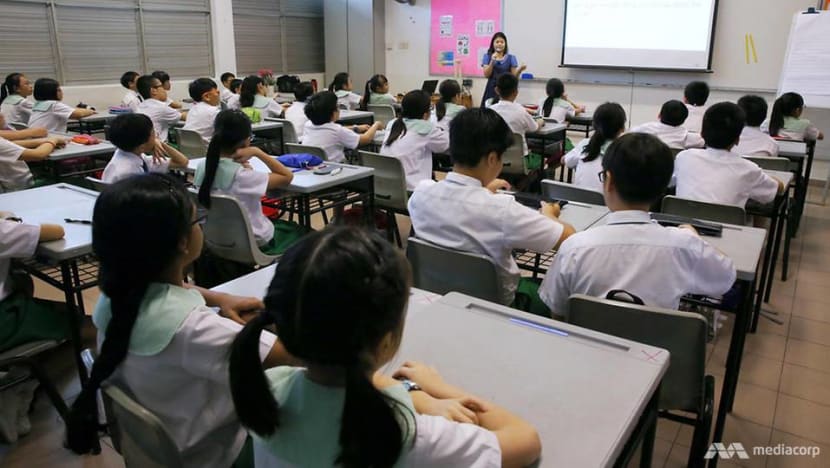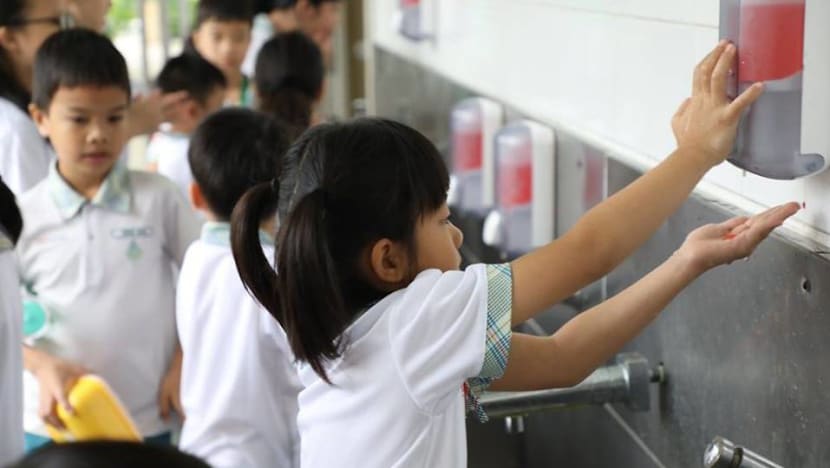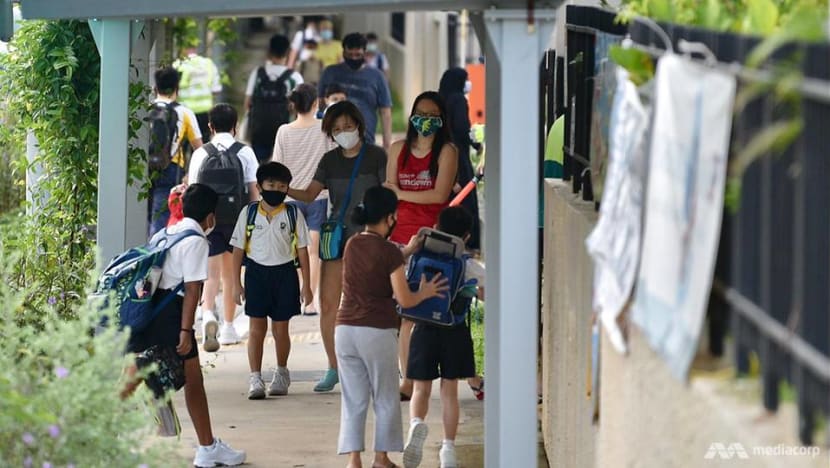Commentary: Fretting about your child going to Primary 1? Here’s advice from a principal
It is a rite of passage and the start of more than a decade-long academic journey for most children in Singapore, so how should parents prepare their kids for Primary 1? A principal has some tips.

Students attending a class at a primary school. (File photo: TODAY)
SINGAPORE: The P1 Registration Exercise can be either a stressful experience or a non-event, depending on the expectations and options that parents have when choosing a primary school.
Some put in great effort to enroll their children in their school of choice. Inevitably, a few will face disappointment if they are unable to secure the place they had hoped for.
But no matter the result, our role as parents is to ensure our children are confident and look forward to school.
I understand how worried parents can be over how ready their children are, as a mother myself.
READ: 'Targeted intervention' for Primary 1 students with social, behavioural needs in all schools by 2026
It has been almost a decade since my son first entered primary school. Little did I expect that he would put up such huge resistance to entering the school gate.
Throwing his oversized shoes at me, he created quite a scene, heightening everybody’s anxieties, especially mine. It took a school staff to calmly and firmly lead my son in, still sobbing, but no longer struggling.
Throughout the rest of the day, I had to steady my own nerves, worrying over how he would manage while in school.
A few weeks passed. But before long, my son was looking forward to school, all smiles and no tantrums whatsoever.
As a school principal, I have experienced many more "first days of school". This day is as exciting for the children as much as for their parents. Or as worrying. Or as petrifying.
This is why my team and I spend a considerable amount of effort every year to provide support to Primary 1 children and their parents.
READ: Commentary: After the craziest year, teachers start first day of school with nervous apprehension
FOCUS ON SOCIAL SKILLS FIRST
It helps to remember that beginning primary school signals the start of a long educational journey where our children not only learn academic subjects, but also go through a whole array of meaningful school experiences.
Among other things, they will learn to care for themselves and others – education is more than just about how well they score on tests and examinations.

They will spend the first few weeks of Primary 1 learning basic social and emotional skills, like greeting their teachers and friends, queuing and taking turns to talk, buy food or items from the bookstore.
READ: Commentary: Parents need not fear getting ready for the first day of school
To help them ease into such practices before the start of school, parents can start establishing routines so their children can better manage time. Start with a simple timetable for the day with blocks of time for learning, play, exercise and sleep.
Parents can also prepare learning activities such as colouring or listening to stories, and simple tasks for their children to do on their own like changing their clothes, packing their bags, returning their plates and wiping the table after meals.
These can help children exercise and develop focused attention and responsibility and develop the confidence to carry out similar activities independently in school.
One common concern parents have is about how they can support their children academically. Here, it is important to recognise that children come with different levels of academic readiness.
Comparing different students generates unnecessary anxiety and may even give children the impression they are not up to mark right from the beginning of their school journey.
READ: Commentary: Afraid your kids will catch HFMD? Don’t let modern day parenting be ruled by fear
BEING PREPARED ACADEMICALLY
At the start of Primary 1, children should be able to express personal needs and wants and have basic understanding of numbers up to 10. Teachers will teach students how to read, speak or write in complete sentences, and help them understand mathematical concepts such as addition and subtraction.
It is equally important for children to have skills and dispositions (e.g. social and emotional skills, life skills, perseverance, reflectiveness) they can use to navigate the new school environment.
We know that children are naturally curious and indeed research has shown that curiosity is associated with better learning outcomes.
Hence, tapping on a child’s curiosity by encouraging them to try different ways of doing things can help them with figuring out adding and subtracting, resolving disagreements with friends and remembering things in school.
READ: Commentary: Teachers have 12 weeks of holiday each year – fact or myth?
Teachers at Primary 1 will also ascertain, through observations and simple activities, whether children are ready to grasp what they are taught. They are mindful to differentiate learning tasks according to students’ needs.
Activities are planned in bite-sized pieces, to be completed at varying durations. This is how my teacher helped a student who started school unable to read or spell. The teacher asked him to choose just one word, out of a list, to learn.
READ: Commentary: Learning to let go as a parent of a Primary 1 child
The student, of course, chose the shortest word. He focused his efforts on learning this word, until he could do it. The teacher then gradually increased the number of words for him master spelling. Eventually, having experienced success, the student became even more motivated to continue learning.

In today’s learning environment, teachers know parents are important partners so they make it a point to maintain regular communication to keep them updated on their children’s learning progress.
Where some children, especially those with special educational needs, require additional transition support, parents could request to meet with the form teacher before school starts to discuss the child’s needs and plan ahead on how best to ease the child into school.
Sharing information on the child’s coping strategies or assistive technologies and connecting his teachers with his pre-school educators and others who know him well can help. With the information, the school can establish consistent strategies to support the child, whether at home or in school.
For example, when a child has difficulty expressing himself or herself, the school can use the same set of visual cue cards and instructions his or her parents use to communicate with the child.
Listen to three working adults reveal how their PSLE results have shaped their life journeys in a no-holds barred conversation on CNA's Heart of the Matter podcast:
LEARNING TO ROLL WITH THE PUNCHES
Of course, despite all the best preparations, we still find students losing their way around the school or misplacing their wallets. We cannot completely shield children from difficulties and challenges.
READ: Commentary: Getting kids ready for primary school has to start even before they attend pre-school
Like flying a kite, it is about trying to know when to rein in the kite in the midst of changing winds, and when to let out the line for the kite to fly higher.
As parents, it is also a judgement call in deciding when to step in to help address a challenge that could potentially overwhelm them, and when to seize such teachable moments for children to learn and develop important competencies and skills like resilience, independence and problem solving.
These are critical tools they will need for the rest of their lives.
In my own children and in the thousands I have seen come through the school system, I have found that children are fast learners and great adaptors. And I really didn’t have to buy shoes one size too big for my son – because just like others, he could walk and then run the distance in his own time.
Madam Law Li Mei is a principal of a primary school and has worked on curriculum development.












